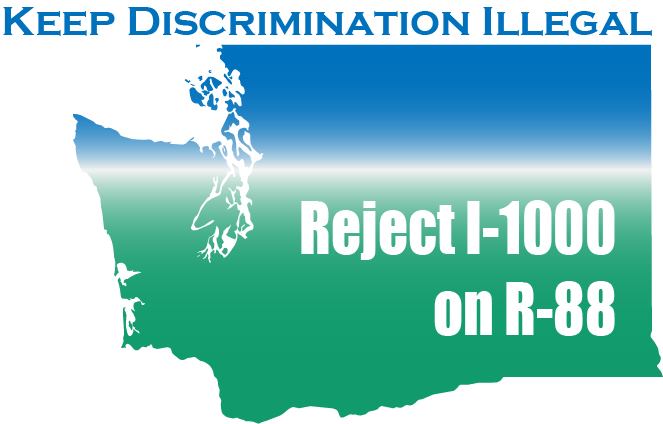Lakewood Chamber of Commerce
Board of Directors
Reject Referendum-88/Initiative-1000
Initiative 1000 Would Allow Unaccountable Bureaucracy to Negatively Affect Current Veteran Hiring Practices and to Implement Different Rules for Different Races
Is it acceptable for a public institution to discriminate against or give preferential treatment to an individual based on characteristics such as race, sex, ethnicity, or sexual orientation?
Washington State legislators think so. And right on cue, the state legislature passed it on the last day of the 2019 session. In 1998, the majority of Washington voters approved Initiative 200, which “prohibited public institutions from discriminating or granting preferential treatment based on race, sex, color, ethnicity or national origin in the areas of public education, public employment, and public contracting.” However, activists have been pushing to repeal Initiative 200 and initiate affirmative action.
 Initiative 1000, also known as the Affirmative Action and Diversity Commission Measure, adds sexual orientation, disability, and veteran status to existing state law that allows “characteristics such as race, sex, color, ethnicity, national origin, age” to be used as factors when considering a person for education or employment opportunities. Supporters insist that I-1000 “allows affirmative action without the use of quotas” and “bans preferential treatment.”
Initiative 1000, also known as the Affirmative Action and Diversity Commission Measure, adds sexual orientation, disability, and veteran status to existing state law that allows “characteristics such as race, sex, color, ethnicity, national origin, age” to be used as factors when considering a person for education or employment opportunities. Supporters insist that I-1000 “allows affirmative action without the use of quotas” and “bans preferential treatment.”
But if you read the bill closely, you will notice its mental gymnastics. The initiative only bans preferential treatment when “using one of the characteristics listed as the sole factor for selecting a lesser-qualified candidate over another.” In other words, as long as these characteristics are considered along with qualifications, a preferential treatment of certain identity groups is perfectly alright under I-1000. It’s discrimination in disguise.
As a matter of fact, other provisions of the initiative indicate preferential treatment based on these characteristics are necessary to achieve “goals and timetables, and other measures designed to increase Washington’s diversity in public education, public employment, and public contracting.”
For example, I-1000 would create a Governor’s Commission on Diversity, Equity, and Inclusion. This unelected board that would not be accountable to voters. The board will have sweeping authority to make decisions on preferences in academic admissions and government hiring. Which begs the question, how does a university or a government agency ensure its compliance with I-1000 and meet its “diversity” goal and timetables without resorting to a quota system or giving preferential treatment based on identity? It’s disingenuous for supporters of I-1000 to claim that this initiative somehow will create equal opportunities for all Washingtonians.
It would take jobs away from veterans. Since 1895, Washington law has provided honorably discharged veterans, their survivors, and partners of 100% disabled veterans a preference in public employment. See RCW 41.04.010 and 73.16.010. I-1000 would eliminate that preference by creating a hidden loop hole; adding honorably discharged veteran or military status to the law that prohibits preferential treatment. That would make current veterans preference against the law. Our veterans and their families deserve better. There’s too much division in our society today. We need solutions that bring us together. I- 1000 (also known as Referendum Measure 88) would create more division by allowing the government to inject race into college admissions and government employment. Race has no place in American life or law. And the Chamber Board opposes this discriminatory practice.



